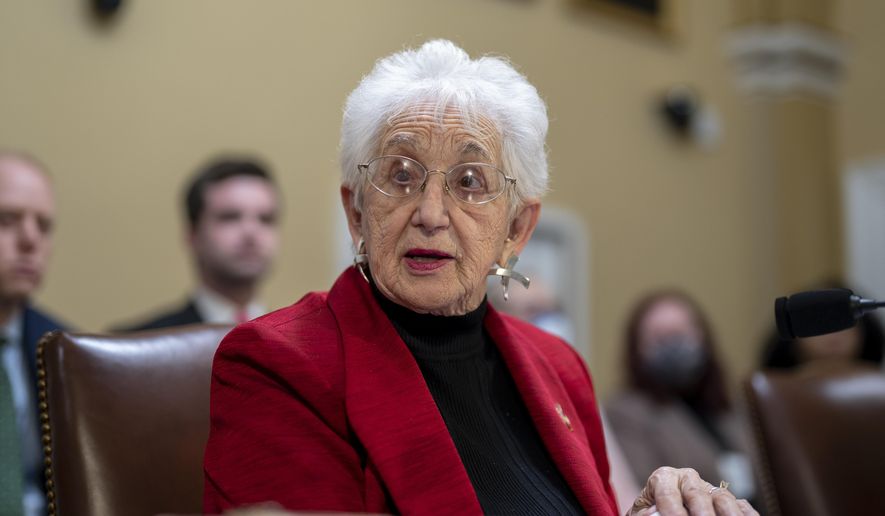The House passed legislation Friday to give parents more say and insight into what is taught in public schools.
The legislation passed largely along party lines, 213-208, with five Republicans joining the Democrats. Republican Reps. Andy Biggs of Arizona, Ken Buck of Colorado, Matt Gaetz of Florida, Mike Lawler of New York and Matt Rosendale of Montana voted against the bill.
“The measure has a fatal flaw, however. While seemingly reinforcing parents’ rights, it undermines the critical principle for conservatives: federalism, the bedrock of our liberty,” Mr. Buck wrote recently in a Washington Times Op-Ed.
He added, “If a GOP-led House says the federal government can mandate that all schools provide parents with copies of teacher lesson plans, what is to stop a future Democrat-led Congress from passing a law that prohibits this type of transparency, despite what local school districts have implemented, and despite what works best at the local level?”
Rep. Julia Letlow, Louisiana Republican and member of the House Committee on Education and the Workforce, authored the legislation, called the Parents Bill of Rights Act, a top priority for Republicans.
The bill references five pillars that school parents have:
• Knowing what is taught in the schools.
• Bringing concerns directly to education officials.
• Viewing the school budgets.
• Protecting sons’ and daughters’ privacy.
• Being updated on any violent activity at the school.
Ultimately, the 30-page bill revises the 1965 Elementary and Secondary Education Act to mandate that public schools make specific information accessible to parents on the internet.
This includes school curricula, education budgets, reading lists and library books. School officials must also tell parents about any violent incidents that occur on school property and talk with parents about how best to protect their children’s online information.
Democrats balked at the legislation Thursday, with Rep. Alexandria Ocasio-Cortez of New York calling it “fascism.”
“So many times across this nation, we found that parents were attacked and called terrorists because they simply wanted to go to a school board meeting to be heard about what’s going on,” House Speaker Kevin McCarthy, California, said recently during a presentation of the bill.
“The right to see the school budgets and how they spend their money, the right to protect your child’s privacy and the right to be updated on any violent activity at the school. We think these are pretty basic things that everybody and every parent should have a right to,” he added.
House Minority Leader Hakeem Jeffries, New York Democrat, told reporters that his caucus will “fight against the legislation.”
“We’ll fight against the banning of books, fight against the bullying of children from any community and certainly from the LGBTQ+ community,” Mr. Jeffries said.
Rep. Gregory Meeks, New York Democrat, accused Republicans of putting “politics over people” with the legislation.
Rep. Pete Sessions, Texas Republican, views the legislation as more than a messaging bill.
“It’s a very thoughtful, deep bill about a problem in this country as a result of the Biden administration and, more specifically, the Biden administration pressuring the attorney general of the United States, who then uses federal law enforcement for matters which they should not be involved in,” Mr. Sessions said, referencing Attorney General Merrick Garland’s memo to Justice Department employees about investigating parents as “domestic terrorists” who were protesting school boards.
Although the measure is not likely to advance in the Democratic-controlled Senate, it will likely be a factor in next year’s presidential and congressional election cycle.
Rallying around what is taught in the public school system is no longer a taboo issue for Republicans. The GOP often ceded the issue to Democrats. Still, public education has become a hotly debated issue since schools were shut down in 2020 because of the COVID-19 pandemic and teachers provided online instruction.
Many parents became politically active after seeing subject matter being taught to their children at home and became concerned that the topics were too polarizing or explicit.
They argued with officials at school board meetings and fought over vaccine and mask mandates as schools reopened. The contentious debate became a successful campaign call for Republican Glenn Youngkin in his 2021 race for Virginia governor. Among the issues was the teaching of critical race theory in K-12 schools.
• Kerry Picket can be reached at kpicket@washingtontimes.com.




Please read our comment policy before commenting.